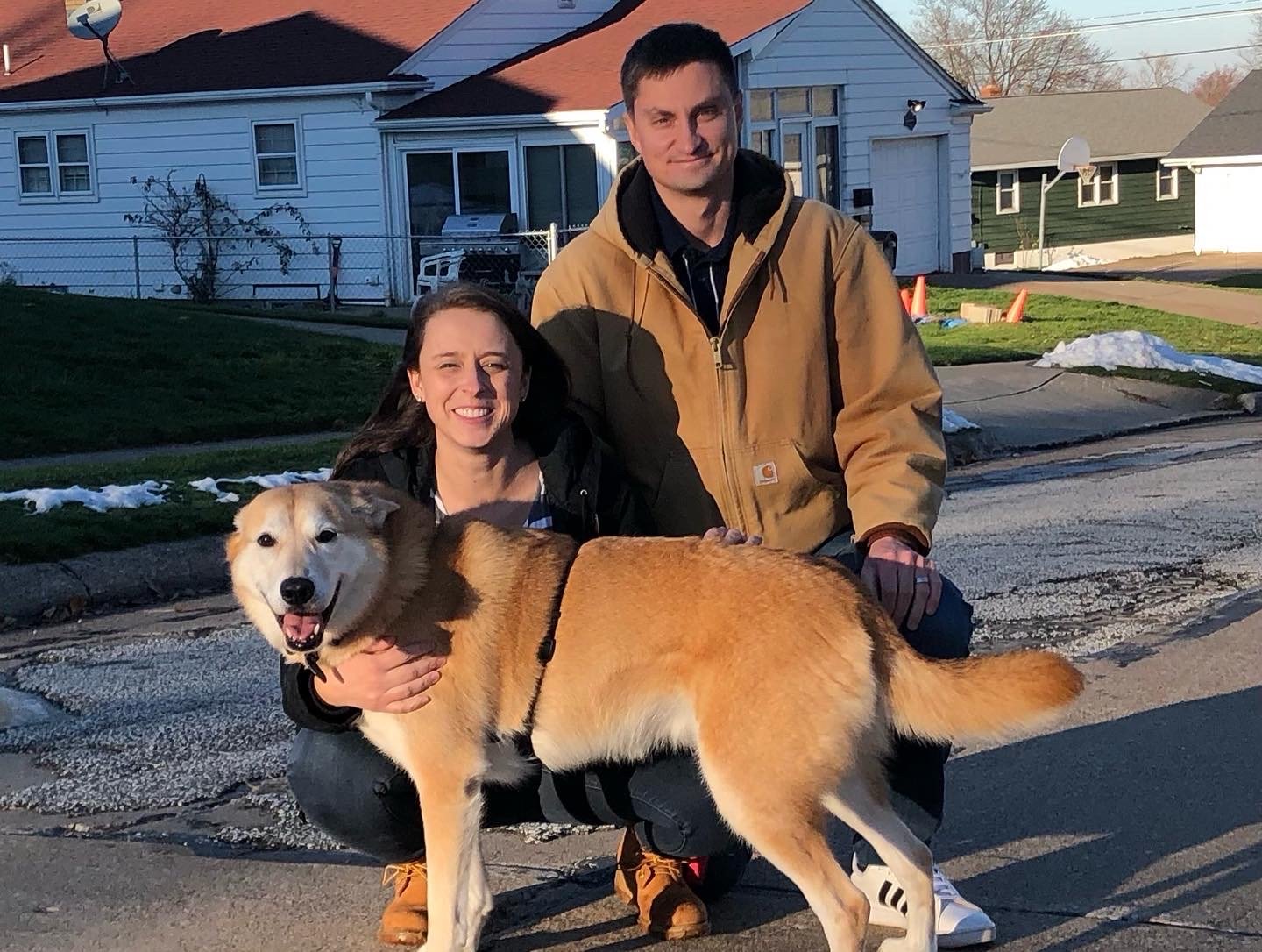How a Vet Behaviorist May Be Able To Help Your Dog
This week we had the privilege of sitting down with Dr. Meaghan Ropski, DVM, DACVB. Dr. Ropski is a veterinary behaviorist in Washington D.C. at Friendship Animal Hospital. She spoke to us about how she can help dogs and their pet parents, options for people who can’t afford to see a vet behaviorist or aren’t able to get into one, what to say to people who think there’s a stigma with medicating dogs, and much more. Fun fact: Jess’s dog, Stanley, is lucky enough to be one of her patients, and she just saw him for his annual recheck.
For people who are unfamiliar with what a vet behaviorist does, can you tell us a little bit about your job and how you help dogs and humans?
Dr. Ropski calls this picture a “family photo.” She’s kneeling beside her husband and her dog, Sadie, who she says is “her reason for getting into behavior.”
A veterinary behaviorist, is first a veterinarian. We have the same knowledge base as your primary care vet or another specialist, but we have additional training in animal behavior, learning theory, psychotropic medications, and forming treatment plans for behavior concerns. We have 3 additional years of learning in behavior, on top of our vet school learning, before we sit for a 2 day national board exam. A veterinary behaviorist works with families to manage challenging behaviors, typically anxiety, fear, and aggression. They work with your primary care vet to rule out medical concerns and with your trainer to form a treatment plan that suits the needs of the family. A treatment plan involves a safety plan, environmental modification, training and behavior modification and commonly medication to reduce stress and anxiety.
How do you respond if someone asks you how to determine if they should bring their dog to a vet behaviorist?
If you and your dog are struggling with any fear, anxiety, stress, aggression OR have reached a plateau in training / behavior modification, it's a good time to start that conversation. I will always say - it's never too early to start talking (especially when most of us are booked out months in advance). We can make more changes for the better when we start early.
How do you work with trainers to support dogs and their families?
If a family is already working with a trusted trainer (meaning non aversive / punishment based training), I send them right back! Training and behavior modification is essential to a treatment plan. If they are not working with a trainer already, we make recommendations for one in that family’s area that meets their needs once they are ready and good learning can take place.
Dr. Ropski calls Sadie “the most perfect princess.”
What’s your favorite thing about what you do?
Seeing the change and improvement from year to year in my families is the absolute best. Some families I’ve known for 5+ years and we get to a point where we’re no longer making big changes to treatment plans but can focus on smaller items (because the big things have already been accomplished).
What’s the most challenging part of your job?
Discussing difficult decisions with a family, whether that is rehoming, relinquishing or even euthanizing a dog. We focus a lot on quality of life, human and animal suffering and if we are doing everything possible and are still not seeing success - this may not be the best home / environment for that dog. It is heartbreaking to reach this point, but having someone to talk about the options with can be very helpful for these families facing tough decisions.
How do you respond to people who are against medicating their dogs because of the stigma in our society?
I think about our dogs’ brains being very similar to a human brain. If a human / child / family member was suffering from anxiety or other mental health concerns and a medication could help them to be successful and live comfortably / free from suffering then we would want to give them every possible chance we could to reach that success. Our dogs are no different.
Dr. Ropski tells TOC that this photo is “a celebration" because Sadie was “NOT reacting to a dog on a walk.”
Tell us about your dog.
Our perfect princess Sadie? She is a 70 pound lab / husky mix. She is the reason I got into behavior. She had horrible separation anxiety when we adopted her and through a medication and behavior modification plan she is happy and comfortable to be alone at home for a whole work day. She is getting older (she’ll be 10 in September) and we are seeing some noise / storm anxiety start to develop. She LOVES snacks, sleeping in her bed, and spending time in her yard.
There aren’t that many vet behaviorists in the US. If someone doesn’t have a vet behaviorist near them, what options do they have?
Their primary care vet is a great place to start! Some vets are comfortable providing behavior assistance and some are not. It doesn’t hurt to have that conversation. If a DACVB is not near you (and you need one), there may be a veterinary behavior resident that is closer. There are also some DACVBs that will do virtual consults - either with you or with your primary care vet.
If someone can’t afford to work with a vet behaviorist, are there other ways they can help their dog?
Their primary care vet may be an option, especially if a medication is needed to be successful. A positive reinforcement trainer is always a good place to start - they can help to modify the environment as well as providing training options. Options as simple as - avoiding triggers, increasing mental enrichment, and reinforcing desired behaviors – can be helpful to avoid practicing a behavior, meeting their needs and cultivating your relationship. With any of these options - they don’t “replace” a veterinary behaviorist, but they can be helpful should one not be in a family’s budget.






